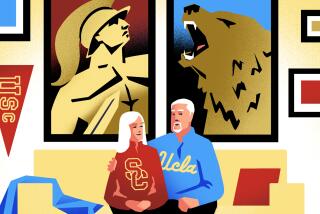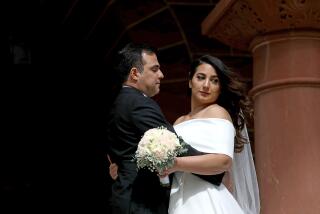Taking a Stand on Ceremony
- Share via
It is happening again! Real, live people are engaging and testing my pastoral principles . . .
The young couple sits nervously on the sofa in my office. They are excited and happy. They want to get married. She had some contact with our particular Christian tradition in her early youth, but none in the last decade. He was raised by a single mom who made great sacrifices for him but never brought him into meaningful contact with any Christian community. They are living together on the other side of the city, but their lease is running out and they will be moving in the near future. They came to me on the recommendation of the bride-to-be’s best friend, who once was part of our congregation. They are slightly embarrassed, but eager and sincere. They ask: “Will you officiate at our wedding?”
It is such a simple question and deserves a simple answer, but I hesitate. That question always stirs to life the fundamental convictions that shape my ministry. So I sit uncomfortably in my office, pressured between solid convictions and real, loving people.
I can’t help but think of old Tevye from “Fiddler on the Roof.” He shouts “tradition” with great fervor. But when his beloved daughters challenge him with their marriage plans, he is forced to reconsider the relationship between that tradition and the call to love his children. Like Tevye, I find myself saying, “On the one hand . . . “
On the one hand stands my conviction that marriage in a Christian context presupposes Christian community. The guests are not meant to be spectators at an event, but a congregation of God’s people called to witness and celebrate the beginning of something new. When these two people pledge their love and faithfulness to each other, the model for their pledge is the never-ending, self-sacrificing love of Christ, the same love that creates Christian community.
And where in this society does God give the blessings that these two people so ardently seek on their wedding day? Where in this society are the values of Christian marriage--forgiveness, faithfulness and self-giving--extolled and (at least in theory) practiced? In the Christian community. I am convinced that marriage in a Christian context is meant to draw its meaning and support from the life of the Christian congregation.
So on the one hand, I want to say to these two eager people who sit before me: “Before you declare your vows in the presence of a Christian pastor and within a Christian context, you two should become members of a Christian congregation. The promises you want to make are powerful, the blessings you seek are vast. You should know more before you step forward. Only in the fellowship of believers can you begin to appreciate what you are truly seeking.”
But, on the other hand . . . I also am convinced that these two young people sitting on my sofa are precisely the two people God wants me to care for, here and now. For all three of us this moment is a critical moment.
Perhaps for the first time in their lives, these two people have come to the Christian community and asked for something. Somewhere in the midst of their own love for each other they have sensed a spiritual dimension that stretches beyond them. Isn’t this a testimony to God’s hidden work?
That they do not think of Christian community when they think of God shouldn’t surprise me. Spirituality, like everything else these days, has become personalized and individualized. So on the other hand, this young couple incarnate the challenge placed by the Christian community in this metropolis at the end of the millennium.
That may sound over-dramatic, but I believe it is true. We are surrounded by spiritual seekers. They are not necessarily seeking Christianity or any other specific religion. But they are seeking. How can we respond to their search in such a way that both acknowledges their quest and opens them up to a deeper relationship to God and the Christian community?
“Pastor, will you officiate at our wedding?” I sit between theological convictions and missionary challenges and try to be faithful to both. So, I invite them to our marriage workshop, I talk to them about our adult baptism class, I welcome them to our worship services, I listen to their questions and concerns, I try to be a pastor for them . . . and I say, “Yes.”
On Faith is a forum for Orange County clergy and others to offer their views on religious topics of general interest. Submissions, which will be published at the discretion of The Times and are subject to editing, should be delivered to Orange County religion page editor Jack Robinson.


